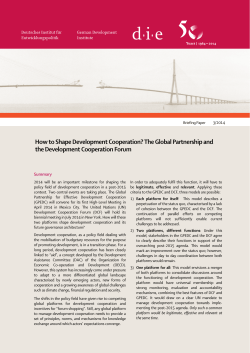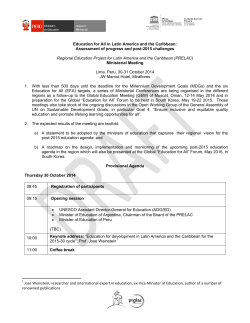
2014 Development Cooperation Forum
2014 Development Cooperation Forum New York, United Nations Headquarters, 10-11 July 2014, ECOSOC Chamber “Bringing the future of development cooperation to post-2015” Objectives of the 2014 DCF The future of development cooperation The Fourth biennial High-level Development Cooperation Forum (DCF) will advance global dialogue on the future of development cooperation in the post-2015 era. The DCF Switzerland High-level Symposium (Montreux, 24-25 October 2013) discussed the future role and shape of development cooperation, given the anticipated broadening of the post-2015 development agenda beyond the focus of the MDGs to sustainable development. It reviewed the need to redesign sources, channels, instruments and major uses of development cooperation, in light of new and increased funding needs. It also considered how development cooperation would need to adapt to a unified and universal agenda, applying to all countries. It will engage all stakeholders: donor and programme countries, Southern partners, civil society, philanthropic foundations, the private sector, parliamentarians, local and regional governments and international organizations. The 2014 Forum has four key objectives: Assess how a global partnership for development beyond 2015 could work in practice Examine implications of a post-2015 development agenda for development cooperation Identify ways to enhance national and global accountability and effective monitoring of development cooperation Advance policy dialogue and concrete actions by Southern development cooperation partners on commons issues and challenges These objectives are set out in the DCF Support Strategy for the 2012-2014 DCF cycle. The two-year preparatory process for the Forum has combined analytical work in these areas with stakeholder engagement and high-level policy dialogue. Renewing the global partnership for development The DCF Ethiopia High-level Symposium (Addis Ababa, 6-7 June 2013) launched a dialogue on the purposes, principles and features of a renewed global partnership from the perspective of all development cooperation actors. It also explored the characteristics of a post2015 monitoring and accountability framework. Effective and accountable development cooperation The DCF Germany High-level Symposium (Berlin, 20-21 March 2014) explored the effectiveness and accountability of development cooperation in the design and implementation of a post-2015 development agenda. It provided concrete reflections on the features of a global monitoring and accountability framework for development cooperation, to ensure delivery on commitments and progress towards sustainable development results. The symposium drew on evidence from analysis on quality and effectiveness, accountability in development cooperation and initial findings of the UN DCF Global Accountability Survey on national mutual accountability. South-South development cooperation The DCF offers a dedicated space for South-South development cooperation partners to present their shared view on the principles, definition, measurement and comparative advantage of South-South development cooperation, as well as their joint vision to pursue such cooperation in the post-2015 era. This emanates from expert and political dialogues initiated and supported by South-South development cooperation partners, as well as related analytical work. Southern partners have met in Delhi, India (April 2013); Addis Ababa, Ethiopia (June 2013); Istanbul, Turkey (December 2013); Berlin, Germany (March 2014), and Mexico City, Mexico (April 2014). Thematic and stakeholder dialogue The DCF: global policy dialogue with local impact Special policy dialogues supplemented the symposiums on specific issue areas: gender equality and the empowerment of women (Vienna, Austria, December 2012); global philanthropy (New York, April 2013); and decentralized development cooperation (Rabat, Morocco, October 2013). The DCF provides a forum for dialogue on the effectiveness and coherence of international development cooperation, a platform to engage all stakeholders and an authoritative source of analysis on trends in development cooperation. The DCF serves to: Programme for the 2014 High-level DCF At the two-day meeting, participants will examine how development cooperation will need to change to support implementation of a post-2015 development agenda. The aim is to inject key messages and concrete proposals on the future of development cooperation into the preparations of the post-2015 development agenda. The programme is designed to engage participants in candid discussions and to generate recommendations through interactive moderated dialogues. The programme will cover a range of issues including, among others, aid quantity and quality and the changing role of official development assistance (ODA), new emphasis on sustainable development, the engagement of the diversity of development cooperation actors and its implications at the country level, SouthSouth cooperation, functioning of a renewed global partnership for development, mutual accountability and transparency, and global monitoring and accountability for development cooperation. The latest programme will be made available on the DCF website. The 2014 DCF will provide concrete inputs to the preparations for a post-2015 development agenda and to the Third International Conference on Financing for Development. Pre-meetings and side events A number of pre-meetings and side events will take place before and during the 2014 DCF. Side events will be held during the lunch breaks of the two-day meeting. All stakeholders are welcome to propose the organization and co-sponsorship of the side events. The latest list of side events will also be made available on the DCF website. Other planned events include closed meetings of the DCF Advisory Group; a meeting of the Friends of the DCF; a meeting of the Core Group of Southern Partners; and a meeting of the Steering Committee of the Busan Global Partnership for Effective Development Cooperation. Focus the dialogue on development cooperation on its support for achieving post-2015 development goals Strengthen the connection between global dialogue and policy and practice at all levels Facilitate discussion that generates concrete guidance and tools for practitioners Strengthen partnerships at the country level. The DCF also builds synergistic relationships with other relevant initiatives, including the Busan Global Partnership for Effective Development Cooperation. The new High-level Political Forum on sustainable development, created in follow up to the Rio+20 Conference, will take into account the work of the DCF. The DCF is one of the principal functions of the United Nations Economic and Social Council. For further information, please contact: DCF Secretariat Development Cooperation Policy Branch, Office for ECOSOC Support and Coordination, United Nations Department of Economic and Social Affairs, th UN Secretariat Building, 25 floor, New York, NY 10017 Email: dcf@un.org Website: www.un.org/ecosoc/dcf
© Copyright 2025





















